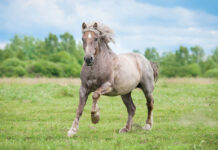Q. I am interested in breeding my maiden mare, but am concerned about EVA. How can I ensure that the semen I use for her artificial insemination is free of this disease?

A. Although equine viral arteritis (EVA) typically creates influenza-like symptoms of fever, loss of appetite, depression, nasal discharge and swollen limbs in horses, it also has significance as a venereal disease, with the potential for high rates of abortion. As many as 60 percent of EVA-exposed stallions become carriers and can shed the virus in their semen. The success of reproductive technology in shipping cooled semen and the increased use of frozen semen has encouraged more people to breed mares to stallions in far away places. Unfortunately, EVA is able to persist in cooled or frozen semen, as well as in fresh semen.
If an infected stallion is bred to a mare that has not been immunized against EVA, she is likely to contract the virus, resulting in lack of conception, although her future fertility will not be affected. A mare can become infected with the virus within a week following insemination of contaminated semen if she is unvaccinated. If a pregnant mare is exposed to the virus through nasal secretions when she is more than three months along, then abortion is likely; if she is near term and she’s exposed, the newborn foal will die from viral pneumonia contracted in utero.
In this country, there have been recent outbreaks of EVA in six states. The first step in limiting transfer of this disease is to identify if a stallion is a carrier by testing his blood for EVA antibodies. If his blood tests negative, then he is considered free of the virus but must be immunized within 10 days of the test. Annual boosters are recommended for breeding stallions. If his blood test comes back positive for EVA, then his semen will need to be tested directly to evaluate for viral shedding by the venereal route.
A mare should be vaccinated at least three weeks in advance of insemination if she is to be bred to an EVA-positive stallion. It is the responsibility of the stud farm to advise you of its stallion’s status as EVA free, or not, and to inform you of implemented protective measures. A formal written confirmation of a stallion’s non-shedding status enables you to use him for safe breeding to your mare with greater confidence.





